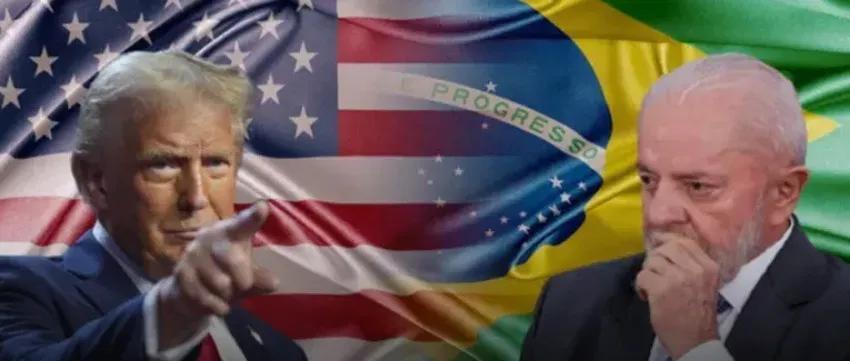Sérgio Westphalen Etchegoyen for FinGurú
Relations between Brazil and the United States, the first nation to recognize our independence, were consolidated thanks to our positions in the three major conflicts of the last century: the two world wars and the Cold War.
In World War I, we sent a complete field hospital and several officers who fought alongside French and British units. In World War II, we sent 25,000 fighters, including 133 women (the Brazilian scholar Frank McCann wrote a beautiful article about "The Forgotten Ally": https://eialonline.org/index.php/eial/article/view/1193/1221). During the Cold War, we brought ideological confrontation into our homes, streets, schools, universities, and even barracks, and we killed each other in the name of Western values. The widespread letter from Donald Trump is undoubtedly an absurd and unjustified interference in foreign problems, but so are youth anti-Americanism and a preference for dictatorships and autocracies. In divorces like this, there are no innocents. Our foreign policy has greatly contributed to this misfortune. We have abandoned the West, to which we belong, for a club that despises us, as evidenced by our absences at the G20 meeting. It is impossible to end well. In the end, we will all pay the consequences.
Brazil has always known how to compensate for our historic power deficit, which has only grown, with a proud foreign policy of intelligent and productive neutrality that has ensured us dialogue and markets around the world.
Trump is an irresponsible madman, and we helped him become even more so. We can only hope that our reaction is not a reckless patriotism, or we will sink even further. And among us, the Supreme Court has indeed made a mess, overstepped its bounds, and meddled.
The letter deserves my strongest condemnation, but I cannot absolve Lula's outbursts or Celso Amorim's student assembly leftism of responsibility. This misfortune falls on our diplomats, professionals whom I admire and who, I am sure, are exasperated at not being heard. The self-exiled son of Bolsonaro will pay the consequences of mentioning his father. Now, we must await a more thoughtful assessment of the damage and endure the platform bravado that will arise from a government that has only a very rusty throat left.
But, as I enjoy seeking analogies in history, I recalled Getúlio Vargas's stance in the years leading up to World War II.
According to data from the now-defunct League of Nations, Brazilian exports to the United States between 1933 and 1938 fell from 46.7% to 34.3% of the trade balance, while imports grew from 21.2% to 24.2%. In the same period, as Nazi Germany advanced, sales and purchases skyrocketed from 8.1% to 19.1% and from 12% to 25%, respectively.
Hitler was already emerging as the great threat he became. The United States was undergoing a colossal internal conflict between a predominantly isolationist society and a president (FDR) aware that war was inevitable and that his country would be drawn into it. Here, we still had to pay our debts to the United Kingdom, where the then First Lord of the Admiralty, Churchill, was the most eloquent voice in the world against the German threat.
It was in this uncertain and challenging scenario that Brazilian foreign policy achieved the feat of increasing trade with Berlin and facilitating our path toward what was known to be inevitable: joining the Allies. The result was our industrialization.
The parallel is inevitable: in both cases, we had the United States on one side and, on the other, a totalitarian power seeking to overthrow them. In each case, we adopted different diplomatic stances. In the first, the talent of Oswaldo Aranha and his team managed to expand trade with Germany while maintaining what I have already described as a proud and responsible neutrality. The motto was "Neutrality and Peace." A beautiful page from the Ministry of Foreign Affairs. Today, we join Russia, Iran, and China, considered by Washington as their greatest threats, to blame Ukraine, condemn Israel, and advocate for the end of the dollar as an international currency, not to mention the military stalemate in Moscow or support for FARC at the São Paulo Forum. If we add to this a stubborn and iconoclastic Trumperamental, it is easy to understand the consequences of our outbursts and bravado.
Back then, the irrelevant country that we once were knew how to see opportunity and take full advantage of it for the benefit of the national interest. Today, as one of the largest economies on the planet, we behave like agitators of student unions.
This interference, as I have said, is unacceptable and unjustified, but I hope they do not try to solve the problem with more patriotic declarations nor invite those of us who will pay the price to lift the curtain of false patriotism that obscures the mistakes they have made.
General Sérgio Westphalen Etchegoyen was Chief of Staff of the Brazilian Army and Minister of the Institutional Security Cabinet during Michel Temer's government. A prominent political analyst and a permanent consultant for executives of banks and major companies in Brazil.

Comments